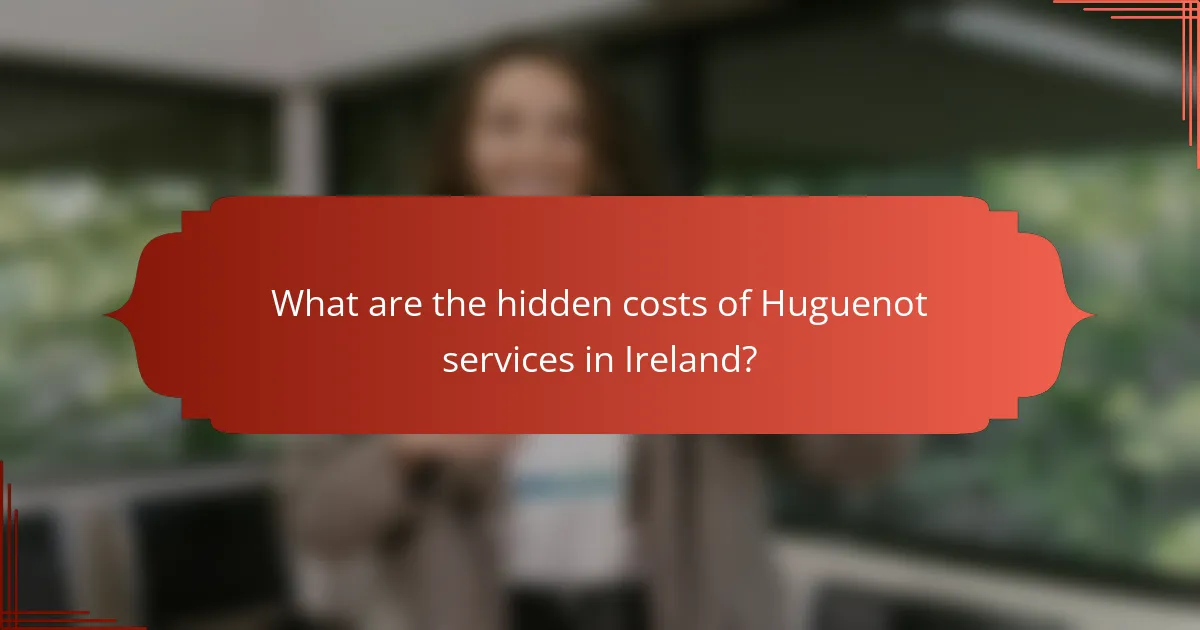Understanding the hidden costs associated with Huguenot services in Ireland is crucial for effective financial planning. These costs can include various administrative fees and unexpected charges that may not be immediately evident, impacting your overall budget. To promote transparency, it’s essential to request detailed information about services and their associated costs, enabling informed decision-making. By budgeting for these hidden expenses and consulting with financial advisors, you can better prepare for potential financial implications and reduce the risk of unforeseen burdens.

What are the hidden costs of Huguenot services in Ireland?
Hidden costs of Huguenot services in Ireland can significantly impact your overall financial planning. These costs often include administrative fees, unexpected service charges, and long-term financial implications that may not be immediately apparent.
Administrative fees
Administrative fees are common in Huguenot services and can vary widely based on the provider. These fees may cover paperwork processing, record keeping, and other essential administrative tasks. It’s crucial to ask for a detailed breakdown of these fees upfront to avoid surprises later.
In Ireland, administrative fees can range from a few dozen euros to several hundred, depending on the complexity of the services required. Always clarify what specific services are included in these fees to ensure transparency.
Unexpected service charges
Unexpected service charges can arise during the course of Huguenot services, often related to additional requests or changes in service scope. For example, if you require extra documentation or expedited processing, these can incur additional costs that were not initially disclosed.
To mitigate these charges, maintain clear communication with your service provider and confirm any potential costs associated with changes to your service agreement. Request a comprehensive list of possible additional charges to stay informed.
Long-term financial implications
Long-term financial implications of Huguenot services can affect your budget and financial planning significantly. These may include ongoing fees for maintaining records or services that extend beyond the initial engagement period.
Consider the cumulative effect of these costs over time. For instance, if you anticipate needing ongoing support, factor in these expenses into your long-term financial strategy. It’s advisable to regularly review your service agreements to ensure they align with your financial goals and needs.

How can I ensure transparency in Huguenot services?
To ensure transparency in Huguenot services, request comprehensive information about the services offered and their associated costs. This clarity helps you make informed decisions and avoid unexpected expenses.
Request detailed service breakdowns
When engaging with Huguenot service providers, always ask for a detailed breakdown of services. This should include itemized costs for each service, such as administrative fees, processing charges, and any additional expenses that may arise.
For example, if you’re considering a service package, ensure it specifies what is included, such as document preparation or consultation hours. This transparency allows you to compare the value of different offerings effectively.
Compare multiple service providers
Comparing multiple Huguenot service providers is crucial for transparency. Gather quotes from at least three different providers to understand the market rates and service offerings.
Look for differences in pricing structures and services included. Some providers may offer lower base rates but charge higher fees for additional services, while others may provide a more comprehensive package at a competitive price.
Understand contract terms
Before signing any agreement, thoroughly review the contract terms related to Huguenot services. Pay attention to cancellation policies, payment schedules, and any clauses that may lead to additional charges.
It’s beneficial to clarify any ambiguous terms with the provider to avoid misunderstandings later. Ensure you are comfortable with the obligations and rights outlined in the contract to maintain transparency throughout the service engagement.

What financial planning strategies are recommended for Huguenot services?
Effective financial planning for Huguenot services involves budgeting for hidden costs, establishing a contingency fund, and consulting with financial advisors. These strategies help ensure that all potential expenses are accounted for, providing a clearer financial picture and reducing the risk of unexpected financial burdens.
Budgeting for hidden costs
When planning for Huguenot services, it’s crucial to identify and budget for hidden costs that may arise. These can include administrative fees, maintenance expenses, and unforeseen service charges that are not immediately apparent. A good rule of thumb is to allocate an additional 10-20% of your total budget to cover these potential expenses.
To effectively budget for hidden costs, create a detailed list of all expected expenses and research any additional fees associated with Huguenot services. This proactive approach can help prevent financial strain later on.
Setting up a contingency fund
A contingency fund is essential for managing unexpected expenses related to Huguenot services. This fund should ideally cover three to six months of service costs, providing a financial cushion in case of emergencies or sudden price increases. Regularly contributing to this fund can help maintain financial stability.
To establish a contingency fund, set aside a specific percentage of your monthly budget. Consider using a separate savings account to keep these funds accessible yet distinct from your regular expenses.
Consulting with financial advisors
Engaging with financial advisors can provide valuable insights into managing costs associated with Huguenot services. Advisors can help you navigate complex financial situations, ensuring that you make informed decisions tailored to your specific needs. Look for advisors with experience in service-related financial planning.
When consulting with a financial advisor, prepare a list of your goals and concerns regarding Huguenot services. This will help the advisor provide targeted advice and strategies that align with your financial situation.

What criteria should I consider when choosing Huguenot services?
When selecting Huguenot services, consider factors such as the reputation of service providers, the range of services offered, and client feedback. These elements will help ensure you choose a reliable provider that meets your specific needs.
Reputation of service providers
The reputation of service providers is crucial when choosing Huguenot services. Look for companies with a long-standing presence in the community and positive recognition from industry associations. A strong reputation often indicates reliability and quality of service.
Research online reviews and ratings to gauge public perception. Consider reaching out to local organizations or community members for recommendations, as personal experiences can provide valuable insights.
Service offerings and flexibility
Evaluate the range of services offered by Huguenot providers to ensure they align with your needs. Some companies may specialize in specific areas, while others provide a broader array of options, including financial planning, legal assistance, and cultural integration services.
Flexibility is also important; choose a provider that can adapt to your unique requirements and timelines. For example, if you need customized financial planning, ensure the provider is willing to tailor their services accordingly.
Client reviews and testimonials
Client reviews and testimonials can offer insight into the quality of Huguenot services. Look for feedback on various platforms, including social media, review sites, and the provider’s own website. Positive testimonials can indicate a high level of client satisfaction.
When reading reviews, pay attention to recurring themes, such as responsiveness, professionalism, and the effectiveness of services. This information can help you make a more informed decision and avoid potential pitfalls with less reputable providers.

How do Huguenot services compare in major Irish cities?
Huguenot services in major Irish cities like Dublin and Cork vary significantly in terms of availability, pricing, and specialized options. Understanding these differences can help individuals make informed decisions when seeking services tailored to their needs.
Dublin vs. Cork service options
Dublin offers a wider range of Huguenot services compared to Cork, primarily due to its larger population and more diverse community. In Dublin, clients can find numerous providers specializing in various aspects of Huguenot services, including legal, financial, and cultural support.
Cork, while having fewer options, still provides essential services but may require clients to travel to Dublin for more specialized needs. It’s advisable for individuals in Cork to research local providers thoroughly to ensure they receive adequate support.
Pricing differences across regions
Pricing for Huguenot services can differ notably between Dublin and Cork. In Dublin, service costs tend to be higher, often reflecting the city’s overall cost of living, with fees ranging from mid to high hundreds of euros for comprehensive packages.
Cork generally offers more competitive pricing, with many services available in the lower hundreds of euros. Clients should compare quotes from multiple providers in both cities to find the best value for their specific requirements.
Availability of specialized services
Specialized Huguenot services, such as heritage consultations or cultural workshops, are more prevalent in Dublin due to its larger network of professionals. Clients seeking these niche services may find a variety of options, including tailored programs that cater to specific interests.
In Cork, while specialized services are available, they may be limited. Clients may need to consider online options or reach out to Dublin-based providers that offer remote consultations to access a broader range of expertise.

What are the emerging trends in Huguenot services?
Emerging trends in Huguenot services highlight the growing importance of transparency and the integration of digital financial planning tools. These trends reflect a shift towards more accessible and accountable service delivery in the financial sector.
Increased demand for transparency
Clients are increasingly seeking transparency in Huguenot services, which includes clear communication about fees, services, and potential conflicts of interest. This demand is driven by a desire for trust and accountability in financial dealings.
To meet this demand, service providers are adopting clearer pricing structures and providing detailed disclosures. For example, clients may now receive itemized statements that outline all costs associated with their services, helping them understand where their money goes.
Adoption of digital financial planning tools
The adoption of digital financial planning tools is transforming how Huguenot services are delivered. These tools enable clients to manage their finances more effectively through user-friendly interfaces and real-time data access.
Examples of these tools include budgeting apps and investment tracking software, which can help clients visualize their financial health. Many providers are integrating these technologies into their services, allowing for more personalized financial strategies and easier communication between clients and advisors.
